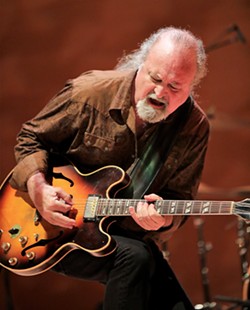Ever since the first mass-produced automobiles began rolling out of factories in the early 1900s, many drivers have used their time on the open road to ponder their present or plan their future. Tinsley Ellis had a long road—a very long road—to do just that in March 2020.
Only six weeks into a 60-date U.S. tour to promote his just-released studio record Ice Cream in Hell, the blues singer/guitarist and his band were (like every other musical act) forced off the road due to the pandemic. It was the first time in 40 years he was unable to gig in front of live audiences, his primary source of income.
“Man, did that really suck!” Ellis says from his home. “I did have 19 albums out, so I didn’t starve to death. But that’s what a performer does, play live. So that was [difficult] to adjust to.”
Ellis used that long 2,400-mile car trip from the last gig in Reno, Nevada to his home base of Atlanta, Georgia, to figure out exactly what he was going to do now. And if you think learning to bake bread or cleaning out the garage qualifies as a Pandemic Achievement, consider this: In 18 months, Ellis wrote 200 new songs. That’s right, 200.
“And I’m still writing!” Ellis laughs. “That became my thing. I was so worried about losing my chops, that I designated every morning from 7 a.m. to Noon to write and record. That’s when my brain is working best. And I did it for six days a week.”
Ten of those tunes show up on his latest record, Devil May Care (Alligator). It will be released on January 21, the same day he and his band start a nationwide tour that will see them play the album in its entirety, along with material that spans his whole career.
Back in Atlanta, Ellis did something that he’s never done before in the writing process. He pulled out every one of his guitars and amplifiers—along with a piano and some other equipment—and nearly 40 different guitar slides at the same time, going from instrument to instrument as he crafted the material. He also dug deep into obscure studio and live recordings from his musical heroes like Freddie King, Michael Bloomfield, B.B. King, and the Allman Brothers Band for further inspiration.
“When I do a song, I basically think ‘this might be good to use a Stratocaster on’ or ‘this will be a Fender song or a Gibson song.’ That dictated it. If you’re going to play a Robert Cray-style song, you have to reach for a Fender. Or the Gibson for an Allman Brothers one,” Ellis offers.
The songs on Devil May Care run the gamut from Southern rock (“One Less Reason,” “Right Down the Drain”) and slow burns (“Don’t Bury Our Love”) to Hendrix-like blues rock rave ups (“Step Up,” “28 Days”). Others include “Beat the Devil,” the voodoo magic of “Ju Ju” and closer “Slow Train to Hell” one of several references to the Underworld and its leader sprinkled throughout.
So, what would Hell look like for the 64-year-old Tinsley Ellis?
“It would look like past two years!” he says. “It’s been really rough. That’s why we wanted an album with something more [uplifting]. That’s even down to the cover of this, with a lot of color and lightness. People have had enough. There are a couple of long, slow sad songs, but the tempo is kicked up a bit on this one. More upbeat.”
“Right Down the Drain,” details the narrator’s predicament after pursuing perhaps too much of a good time—with some narcotic assistance. Ellis says that it’s not based on fiction or imagination. “I own up to all the lyrics there. It all happened to me!” he offers. “And we thought about opening the album with that song. But thematically, you want a more positive message.”
Ellis cites personal faves Little Feat as an example of a band who can write upbeat songs that aren’t necessarily fast. This leads to a side discussion about currently active classic rock-era bands that don’t feature a lot of original members or the same members who recorded their most famous material.
“Some groups weren’t so careful about the replacement players. But quite a few like the Allman Brothers, they would always get the best possible person to replace someone who had left or been fired or passed away,” Ellis says. “Little Feat did that when Lowell George [passed]. And the Allmans did it after Duane was gone. They kept the quality high. Maybe that’s why I play under my own name—so I don’t have to worry about that or have to ever take new band photos!”
Ellis’ band on Devil May Care included Kevin McKendree (keyboards), Steve Mackey (bass) and Lynn Williams (drums), with Jim Hoke and Andrew Carney adding horns. On the road, the lineup will be McKendree’s son Yates (guitar/keyboard), Andrew White (bass) and Erik Kaszynski (drums).
And while the tour through April won’t include any stops in Texas or Houston, Ellis says he expects to get down this way later in the year. Any mention of Houston brings to his mind the guys in ZZ Top, who lost bassist Dusty Hill last July when he passed away at his Houston home. Hill’s bass tech, Elwood Francis, has since stepped into that role (purportedly with Hill’s blessing) for live shows and possible future recordings.
“I think about that loss, they're my favorite band that’s still going,” he says. “I loved Dusty Hill so much, and I get teary-eyed even talking about it. Gee. That’s a big loss to Houston music. I’ve been thinking about the city a lot lately.”
Finally, Tinsley Ellis has an interesting “origin stories” as a blues musician. After seeing the Beatles on The Ed Sullivan Show and getting his first guitar at the age of seven, he discovered a special fondness for the blues via the covers and material of many British Invasion bands like the Yardbirds, Cream, the Rolling Stones and the Animals.
In 1972 while living in southern Florida, he and some friends were listening to Michael Bloomfield, Al Kooper, and Stephen Stills on the influential blues-based Super Session record. They decided to catch B.B. King’s show at a local club, and Ellis quickly took a seat in the front row. When the blues legend broke a string during the performance (and changed it without missing a beat), he handed the discarded strand of metal to the awestruck teenager.
Ellis continued to play, moved to Atlanta, joined the Alley Cats band and then formed the Heartfixers with harpist Chicago Bob Nelson. He put out his first record as a solo artist, Georgia Blue, in 1988, and hasn’t stopped playing or recording since.
So, whatever happened to that magical string? If you think that priceless talisman is framed, or kept under glass with high security, or in a place of honor in Ellis’ home, you’d be…wrong.
“I’ve got it about three feet away from me right now in an envelope with a bunch of other stuff from over the years!” Ellis laughs.
“I don’t really want to put it in a scrapbook, because that means I’m looking back. I have so much more I want to do. I’m keeping things open. I started out as a blues fan and am still primarily a fan. I got to hang out with musicians I love by becoming one!”
For more on Tinsley Ellis and Devil May Care, visit TinsleyEllis.com
Support Us
Houston's independent source of
local news and culture
account
- Welcome,
Insider - Login
- My Account
- My Newsletters
- Contribute
- Contact Us
- Sign out
How Bluesman Tinsley Ellis Got Pandemic Prolific for New Record
Bob Ruggiero January 17, 2022 4:00AM

Tinsley Ellis can't wait to go on the road again.
Photo by Suzanna Khorotian/Courtest of Alligator Records
[
{
"name": "Related Stories / Support Us Combo",
"component": "11591218",
"insertPoint": "4",
"requiredCountToDisplay": "4"
},{
"name": "Air - Billboard - Inline Content",
"component": "11591214",
"insertPoint": "2/3",
"requiredCountToDisplay": "7"
},{
"name": "R1 - Beta - Mobile Only",
"component": "12287027",
"insertPoint": "8",
"requiredCountToDisplay": "8"
},{
"name": "Air - MediumRectangle - Inline Content - Mobile Display Size 2",
"component": "11591215",
"insertPoint": "12",
"requiredCountToDisplay": "12"
},{
"name": "Air - MediumRectangle - Inline Content - Mobile Display Size 2",
"component": "11591215",
"insertPoint": "4th",
"startingPoint": "16",
"requiredCountToDisplay": "12"
}
]
KEEP THE HOUSTON PRESS FREE...
Since we started the Houston Press, it has been defined as the free, independent voice of Houston, and we'd like to keep it that way. With local media under siege, it's more important than ever for us to rally support behind funding our local journalism. You can help by participating in our "I Support" program, allowing us to keep offering readers access to our incisive coverage of local news, food and culture with no paywalls.
Bob Ruggiero has been writing about music, books, visual arts and entertainment for the Houston Press since 1997, with an emphasis on classic rock. He used to have an incredible and luxurious mullet in college as well. He is the author of the band biography Slippin’ Out of Darkness: The Story of WAR.
Contact:
Bob Ruggiero
Trending Music
- Guitarist Uli Jon Roth Presents a Six-String Extravaganza
- Top 10 Butt-Rock Bands of All Time
- Houston Concert Watch: Brooks and Dunn, Chris Isaak and More
-
Sponsored Content From: [%sponsoredBy%]
[%title%]

Don't Miss Out
SIGN UP for the latest
Music
news, free stuff and more!
Become a member to support the independent voice of Houston
and help keep the future of the Houston Press FREE
Use of this website constitutes acceptance of our
terms of use,
our cookies policy, and our
privacy policy
The Houston Press may earn a portion of sales from products & services purchased through links on our site from our
affiliate partners.
©2024
Houston Press, LP. All rights reserved.







